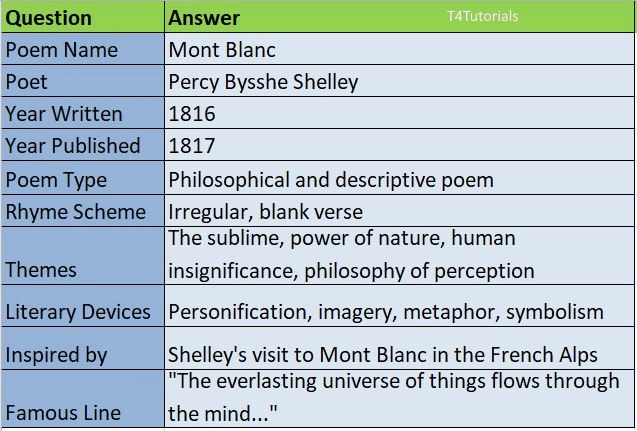Summary:
Mont Blanc is a philosophical poem by Percy Bysshe Shelley, written in 1816, after his visit to the Mont Blanc mountain in the Alps. The poem reflects on the relationship between nature, the human mind, and the vast, incomprehensible power of the universe. Shelley presents Mont Blanc as a symbol of nature’s immense and indifferent power—one that is beyond human control and comprehension. The poem begins with a meditation on the flowing river Arve, which moves chaotically through the landscape, symbolizing both the power of nature and the flow of human thought. Shelley describes the mountain as eternal and unchanging, standing above human existence, which is temporary and insignificant in comparison. He suggests that nature operates independently of human concerns, challenging the Romantic idea that nature is always nurturing and kind. Through rich imagery and philosophical reflection, Shelley explores the limitations of human perception, suggesting that our understanding of nature is shaped by our own minds. The poem ultimately conveys a sense of both awe and insignificance, emphasizing the sublime—the overwhelming power of nature that both fascinates and humbles the human spirit.
10
Score: 0
Attempted: 0/10
Subscribe
| Question | Answer |
| Poem Name | Mont Blanc |
| Poet | Percy Bysshe Shelley |
| Year Written | 1816 |
| Year Published | 1817 |
| Poem Type | Philosophical and descriptive poem |
| Rhyme Scheme | Irregular, blank verse |
| Themes | The sublime, power of nature, human insignificance, philosophy of perception |
| Literary Devices | Personification, imagery, metaphor, symbolism |
| Inspired by | Shelley’s visit to Mont Blanc in the French Alps |
| Famous Line | “The everlasting universe of things flows through the mind…” |